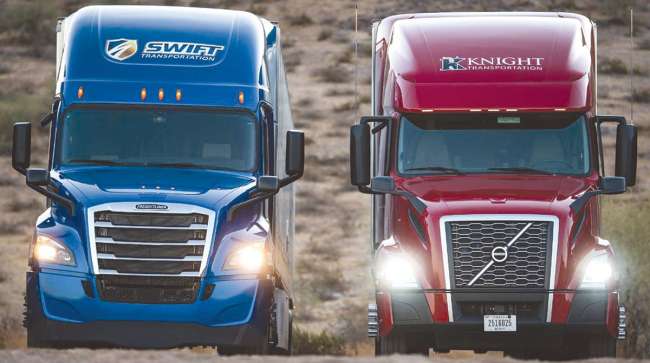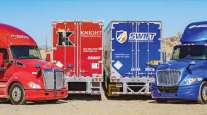Staff Reporter
Knight-Swift Reports Revenue, Earnings Decline for Q1

[Stay on top of transportation news: Get TTNews in your inbox.]
Knight-Swift Transportation Holdings Inc. experienced a year-over-year decline in revenue and earnings during the first quarter of 2023, the company reported April 20.
The earnings report was its first since announcing on March 21 plans to acquire U.S. Xpress for $808 million.
Phoenix, Ariz.-based Knight-Swift posted net income attributable to the company of $104.3 million, or 64 cents a diluted share, for the three months ending March 31. That compares with $208.3 million, $1.25, during the year-ago period. Total consolidated revenue decreased by 10.4% to $1.64 billion from $1.83 billion.
The results missed expectations of Wall Street investment analysts, who were looking for 83 cents per share and quarterly revenue of $1.66 billion, according to Zacks Consensus Estimate.
“We recognize that we cannot entirely escape the cyclicality of the full truckload industry,” Knight-Swift CEO David Jackson said during an April 20 call with investors. “But we have taken intentional steps for years to maximize our performance in every phase of the cycle.”
Among those steps, he said, are acquisitions in the truckload space and technology advancements. The company also has diversified its business operations to mitigate downside pressure through the bottom of cycles, he said.
“When looking at cycles over the last decade, we’ve performed with higher highs and higher lows in each sequential cycle,” Jackson noted. “We are on pace to do that again this cycle, and are already preparing for increasing the high of the next cycle.”
To advance this strategy, Jackson noted the company has been investing in its less-than-truckload and dedicated segments, and has taken steps to move away from the spot market well in advance of a decline in truckload rates. He said these moves have helped the company keep its operating ratio in the mid-80s range.
“The most recent strong cycle, experienced in 2021, enabled the cash flow to make the strategic investments in LTL — in large part to prepare us for the bottom of the cycle,” Jackson said. “Which is where we find ourselves now.”
The planned acquisition of U.S. Xpress represents a major move for Knight-Swift’s long-term business. The company said work continues to complete the transaction, and is targeting a close date early in the third quarter.
“We expect the recently announced acquisition of U.S. Xpress to be one of the factors that enables us to achieve, yet again, another higher high in the strengthening phase as supply attrition makes way for a correction,” Jackson said.
The company’s truckload segment experienced an 8% decline in Q1 revenue to $866 million from $941.5 million last year. Miles per tractor decreased 2.7% while revenue per loaded mile posted a 5.3% average decline year-over-year. Operating income decreased 43.5% to $115.9 million from $205.1 million. The segment consists of irregular route truckload, dedicated truckload, refrigerated, expedited, flatbed and cross-border operations.
The LTL segment saw revenue decrease 0.3% to $213.9 million from $214.7 million during the prior year. Shipment counts decreased 5.7% year-over-year with softer demand. Revenue per hundredweight increased 8.7% while revenue per shipment increased by 5.1%. Operating income increased 0.8% to $26.6 million from $26.4 million.
The logistics segment saw Q1 revenue decrease 51.2% to $136.8 million from $280.2 million. The report noted load count declined by 23.2% year-over-year as brokerage operations continue to face soft demand. This lack of demand resulted in revenue per load decreasing by 36.4% year-over-year. Operating income fell by 67.6% to $12.8 million from $39.6 million.
Want more news? Listen to today's daily briefing above or go here for more info
The intermodal segment saw revenue increase 1.3% to $110.6 million from $109.2 million last year. The company experienced its first year-over-year increase in load count at 8.5% since transitioning western rail partners in January 2022. The report noted that rail service is continuing to make progress, and bid activity is yielding promising new volume gains. Average container count increased by over 300 units sequentially. The container fleet count now sits at approximately 13,000. Operating income in the segment decreased by 66.4% to $5.1 million from $15.2 million.
TD Cowen noted in a report that adjusted earnings per share missed its estimate and the consensus forecast due to a worse-than-expected truckload operating ratio and a surprising $16 million operating loss in the nonreportable insurance segment as small carriers struggled to cover insurance premiums.
“KNX is making a strategic pivot away from its third party insurance business, which took a sizable loss due to small carriers unable to pay insurance premiums,” Cowen analyst Jason Seidl wrote in the report. “De-risking this business unit will lead to a near-term headwind within nonreportable, which was 10% of KNX’s mix in 1Q.”
Knight-Swift ranks No. 7 on the Transport Topics Top 100 list of the largest for-hire carriers in North America.




